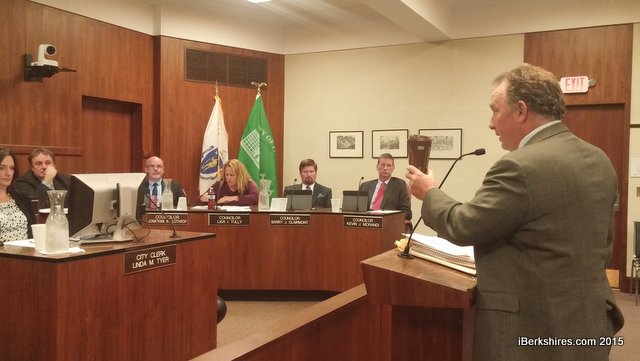Pittsfield Bans Styrofoam Food Containers
|

Rinaldo Del Gallo holds up a paper McDonalds coffee cup to show that making the switch isn't that much of a cost burden.
|
PITTSFIELD, Mass. — On July 1, restaurants will no longer be able to send patrons home with Styrofoam containers.
The City Council approved Tuesday night a ban on expanding polystyrene food and drink containers with a 7-3 vote. The city becomes the ninth community in the state to implement such a ban and the third in Berkshire County.
"The goal is to move to things are fully recyclable," said Ward 5 Councilor Jonathan Lothrop.
The ban will be implemented on July 1, 2016, giving businesses some eight months to make a switch.
After then, restaurants and other food establishments would be subjected to fines - a warning for first offense, $25 for second, and $50 for a third - for each day it serves food or drink in the Styrofoam containers. The Health Department, which already handles restaurant inspections, would enforce the fines.
The bill was first presented to
the City Council by attorney Rinaldo Del Gallo. He said the intent was two-fold: for public health and to reduce littering. The chemical makeup of the containers does not disintegrate when in the environment, Del Gallo said, and has been cited as being a carcinogen.
"We all agree that it is not biodegradable. Once it is in the landfills, it is there forever," Del Gallo said.
Mike Levy, senior director for the Plastics Foodservice Packaging Group, and Matthew Fisher, who represents the Dart Container Corp., both argued against the ban, saying the material is a legal product through the U.S. Food and Drug Administration and shouldn't be banned at the local level. Others said a ban is pushing additional costs onto businesses.
"I really don't think we should ordain this tonight," said City Council President Melissa Mazzeo. "I worry that we are going to hurt our businesses."
Mazzeo was joined by Vice President Christopher Connell and Ward 2 Councilor Kevin Morandi in opposing the ban. Connell made several amendments to loosen restrictions on the ordinance but was rebuffed each time.
First Connell attempted to lower the fines for the second and third offenses to $10 and $20 - down from $25 and $50. He said the businesses are already taking on a higher cost by making the switch and the city shouldn't add to that burden with high fines. Councilor At-large Barry Clairmont, however, said if a company is being cited then it isn't taking on the additional costs because it hadn't made the switch. The fines needs to be enough to make businesses change, he said.
Lothrop added, "reducing the fines to less than a parking ticket would be a travesty."
Connell then tried to change the fines to be weekly instead of per day and again he was defeated. He then pushed to extend the implementation date until January 1, 2017, but again didn't find support from the majority of the council. Restaurants are able to apply for hardships to extend conforming for an extra year.
Overall, Connell said the ban does not accomplish the goals of the ordinance. The ban is only on take-out food and drink containers - such as coffee cups and clamshells - but isn't on packing foam, construction materials, or even cups purchased at a grocery store. Connell says there will still be litter and any possible health risks because of those other sources.
"We are not solving that much by passing this," Connell said.
For Ward 1 Councilor Lisa Tully, any move to lower the health risk earns her favor.
"I think there is a lot of things in history that we didn't know caused cancer and then later found out that they do," Tully said. "We're burning this material and nobody is going to prove to me that it doesn't cause cancer."
She pointed to small businesses who chose not to use Styrofoam as examples of why it wouldn't be much of a burden on businesses.
Morandi, however, says places like Pizza Works and Cumberland Farms have contracted him about the increased cost burden and Connell said in some cases the containers cost two to three times more. Del Gallo countered that argument by showing the McDonald's paper cups used for their coffees.
The council did remove language which required food establishments to use biodegradable materials, which would have had to been approved by the Green Commission. The change limits the ban to only the expanding polystyrene containers.
Tags: Pittsfield, Styrofoam,